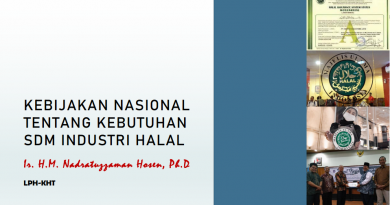Law on Converting Mosques from Waqf
Waqf is a gift from a certain person or institution (al-waqif) to another party (al-mauquf ‘alaih) with certain aims and objectives. If this is done, then there has been a process of changing ownership (taghayyur al-milkiyah) from the party giving the waqf (al-wakif) to the recipient of the waqf (al-mauquf ‘alaih), so that the recipient party has the right to use the object (al-mauqûf bih) in accordance with the purpose and agreement at the time of the contract.
In principle, if the form of use of the object being donated has been determined by the party giving the waqf (al-waqif) to the recipient of the waqf (al-mauquf ‘alaih), then the recipient party must consistently hold the trust in accordance with the agreement at the beginning of the waqf process. Therefore, the purpose of the waqf must be explained during the process of handing over the waqf object.
However, the Tarjih Fatwa issued in 2011 explains that in certain circumstances waqf objects can be converted or even sold to be replaced with another form or location for very objective and rational reasons. For example; endowments of land or mosques in areas that are very prone to landslides or natural disasters. Then it is sold to buy another location that is safer and more strategic so that it can be utilized optimally. Things like this are justified to achieve maximum benefit. However, if there is a better alternative, then of course that is the alternative that must be taken.
Does the reward of the person who donates continue to flow (amal jariyah) even though the mosque has been converted? The issue of reward is of course the one who knows best is only Allah, because a practice is very much determined by one’s intention and sincerity. However, if someone has the sincere intention to do something good, especially for the benefit of many people, even if his example can be an inspiration for other people to do good, then of course the good deed he exemplifies becomes a good deed for the perpetrator, and vice versa.
Has informed me Muhammad bin Ibrahim at-Taimy, that he had heard Alqamah bin Waqqash al-Laitsi say; I have heard Umar bin al-Khattab say from the pulpit; I have heard the Messenger of Allah say: “Indeed, deeds depend on his intentions, and indeed for each person it depends on what he intended, so whoever emigrates because of world affairs that he wants to achieve, or because of the woman he wants to marry, then his emigration is in accordance with what he he expected it.” [HR. al-Bukhari and Muslim].
Even if someone has good intentions and sincerity in donating or donating something for a good purpose (fi sabilillah), then it is betrayed and used for negative things (not in accordance with the good intentions of the person who donated it), they (the person who donated/donated it) still will get a reward from their pious deeds, while the person who abuses the trust will bear the sin themselves. Moreover, if the trust is used for something that is not in accordance with religious sharia, then the giver of the gift/waqf is one of the parties who is betrayed and oppressed. In this way , the person who betrays is a person who is a loser (muflis) who must repay his crime/tyranny with a reward according to the extent and level of his injustice.
Rasulullah saw said: “A Muslim is a brother (to) another Muslim, let him not oppress him, and not let him (neglect him), and whoever (fulfills) his brother’s needs, Allah will fulfill his needs, and whoever makes things easier for a Muslim, then Allah will make matters easier for him on the Day of Resurrection. And whoever covers (the disgrace) of his brother, Allah will cover his (disgrace) on the Day of Judgment.” [HR. al-Bukhari, Muslim and others].
Thus, converting a mosque for purposes such as a medical center/clinic, Al-Qur’an Education Park, office, or Islamic library, will not destroy the charity of the person who donated it. Moreover, this is still in the area of ma’ruf (goodness) and part of the function of the mosque more broadly. However, before doing so, it is necessary to consider the things as explained earlier. So that a person can maintain their trust as well as possible, so that they do not reduce the value of the goodness that has been given by others and do not oppress them.




